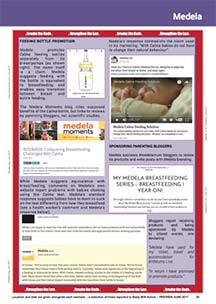Baby Milk Action’s Look What They’re Doing in the UK monitoring report profiles the major baby feeding product companies and retailers.
 I have just added the profile for Medela. This is a breast pump company, which also promotes its Calma feeding bottle with claims such as: “With Calma babies do not have to change their natural behaviour.”
I have just added the profile for Medela. This is a breast pump company, which also promotes its Calma feeding bottle with claims such as: “With Calma babies do not have to change their natural behaviour.”
Despite this claim, Medela’s standard response when parents and health workers have posted comments about babies choking using the Calma teat is to explain babies suck on the Calma teat differently to the breast. Medela says, “We’ve found that sometimes Calma takes a little getting used to”.
Bottles and teats are covered by the International Code of Marketing of Breastmilk Substitutes and should not be promoted. Unfortunately, the UK law does not include feeding bottles and teats in its scope and companies such as Medela therefore feels able to disregard the Code.
Breast pumps in themselves are not within the scope of the Code, but we believe they should still be marketed responsibly. Medela is supportive of “breast milk feeding” and does not encourage parents to use formula. However, it encourages mothers to use pumps in a way that undermines independent information.
NHS Choices states:
“Some women find it easier to express milk by hand than to use a pump, especially in the first few days or weeks. It also means you won’t have to buy or borrow a pump, or rely on an electricity supply. Hand expressing allows you to encourage milk to flow from a particular part of the breast. This may be useful, for example, if one of the milk ducts in your breast becomes blocked.”
This is missing from Medela’s information, which goes to show how information on infant feeding is manipulated when a company has a product to sell. For this reason there is a self-evident conflict of interest when health organisations enter into sponsorship or other financial arrangements with pump companies.
Baby Milk Action has never accepted corporate funding of any kind so as to maintain our independence (we rely on income from our members and supporters, charitable trusts and development organisations).
However, within the International Baby Food Action Network (IBFAN) there has been debate in the past on where to draw the line, particularly as some groups are involved in mother support.
IBFAN and its member groups do not accept funding or have any commercial links with manufacturers or distributors of breast pumps as these present conflicts of interest, whether or not the marketing practices violate the International Code. IBFAN recognises that in some situations pumps are useful in order to provide breastmilk for infants and young children when mothers and babies are separated. For some mothers pumps are useful and we respect their decision to use them.
IBFAN has taken steps to ensure that its post holders have no commercial links to pump companies.
We monitor the industry without fear or favour. If you would like us to continue in this work, please consider:

Well done. This is an important update. Many of these marketing tactics are used by Medela worldwide, and the information about the Family Larrson-Rosenquist Foundation’s lack of arms length status is also important, since Medela has funded research to explore the use of stem cells in breastmilk as medicine. Thank you, especially, for taking steps to ensure that your post holders do not have commercial links to pump companies.
Yes, Medela claim that CALMA is equally good as baby suction pattern” was wrong and they realized their mistake in 2018-2019. From last quarter of 2019, they withdraw this claim and they change the Marketing policy, now they promoted this to the NICU doctors and Lactation Consultants, and let them to take the decision that what is good for the New Moms & Nursing Mothers.
WHO should reconsider adding breast pumps under the scope of the code. Many use language to promote their products such as “hospital grade”, though this statement has no evidence to back it up and is meaningless as a label, other than to give the impression to the consumer of its superior quality. Nearly every mainstream bottle company has their own branded pumps, many touting the “hospital grade” label. The truth is a pump is a pump.
Pumps can also pose risks to the BF relationship. Some women’s bodies cannot respond to a pump, and it gives them the false impression their milk supply is low, especially if the baby is cluster feeding. Any IBCLC worth their qualifications will tell you, pump output is no indication of supply (nappy output and weight gain are better indicators), but most women don’t know this. This very often leads to women giving bottles, and when the child guzzles the bottle, because thats how bottles work (the free flowing liquid forcing the child to swallow regardless of hunger) her fears are confirmed, and very often this is the end of breastfeeding for that woman.
Pumps (should)have a duty of care to provide better information about their products and some of the possible risks, as well as how to correctly measure flange size and how to replace parts regularly. This should be signposted on the package and clearly visible so people know where to go for proper instructions.